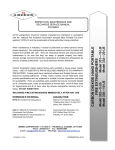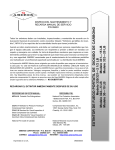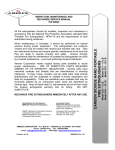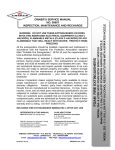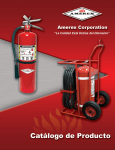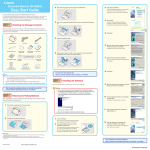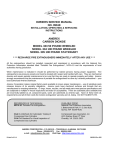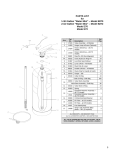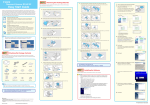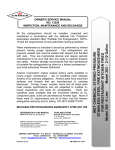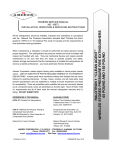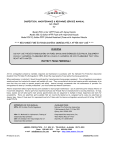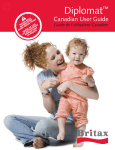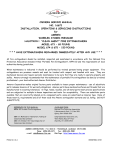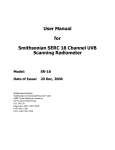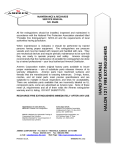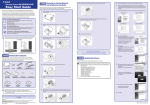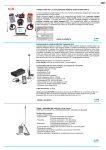Download 05603 – Manual for Hand Portable Carbon
Transcript
INSPECTION, MAINTENANCE AND RECHARGE SERVICE MANUAL P/N 05603 All fire extinguishers should be installed, inspected and maintained in accordance with the National Fire Protection Association standard titled "Portable Fire Extinguishers", NFPA-10 , or The National Fire Code of Canada and the requirements of local authorities having jurisdiction. When maintenance is indicated, it should be performed by trained persons having proper equipment. Fire extinguishers are pressure vessels and must be treated with respect and handled with care. They are mechanical devices and require periodic maintenance to be sure that they are ready to operate properly and safely. Amerex strongly recommends that the maintenance of portable fire extinguishers be done by a trained professional – your local authorized Amerex Distributor. Amerex Corporation makes original factory parts available to insure proper maintenance – USE OF SUBSTITUTE PARTS RELEASES AMEREX OF ITS WARRANTY OBLIGATIONS. Amerex parts have machined surfaces and threads that are manufactured to exacting tolerances. O-rings, hoses, nozzles, and all metal parts meet precise specifications and are subjected to multiple in-house inspections and tests for acceptability. There are substitute parts available that may be incorrectly labeled as UL component parts, some are advertised as Amerex type. None of these meet UL requirements and all of them voids the Amerex extinguisher warranty and UL listing. DO NOT SUBSTITUTE. RECHARGE FIRE EXTINGUISHERS IMMEDIATELY AFTER ANY USE REFERENCES IN THIS MANUAL: AVAILABLE FROM: NFPA-10 Portable Fire Extinguishers National Fire Protection Association 1 Batterymarch Park, P.O, Box 9101 Quincy, MA 02269-9101 CGA C-1 Methods for Pressure Testing of Compressed Gas Cylinders CGA C-6 Standard for Visual Inspection of Steel Compressed Gas Cylinders CGA C-6.1 Standard for Visual Inspection of Aluminum Alloy Compressed Gas Cylinders Compressed Gas Association, Inc. 14501 George Carter Way, Suite 103 Chantilly, VA 20151-2923 National Fire Code of Canada National Research Council Canda 1200 Montreal Rd. Ottawa, ON KIA 9Z9 AMEREX CORPORATION – P.O. BOX 81 – TRUSSVILLE, ALABAMA 35173-0081 Phone: 205/655-3271 Fax: 800/654-5980 e-mail: [email protected] Web Page: http://www.amerex-fire.com Printed in U.S.A. OM05603E Rev.8/13 Model 320/321—2 1/2 LB Model 322—5 LB Model 331—15 LB Model 330—10 LB Model 332—20 LB CARBON DIOXIDE HAND PORTABLE FIRE EXTINGUISHERS AMEREX CORPORATION DOES NOT SERVICE, MAINTAIN OR RECHARGE FIRE EXTINGUISHERS. THIS MANUAL IS PUBLISHED AS A GUIDE TO ASSIST QUALIFIED SERVICE PERSONNEL IN THE INSPECTION, MAINTENANCE AND RECHARGE OF AMEREX FIRE EXTINGUISHERS ONLY. NO INSTRUCTION MANUAL CAN ANTICIPATE ALL POSSIBLE MALFUNCTIONS THAT MAY BE ENCOUNTERED IN THE SERVICE OF FIRE EXTINGUISHERS. DUE TO THE POSSIBILITY THAT PRIOR SERVICE PERFORMED ON THIS EQUIPMENT MAY HAVE BEEN IMPROPERLY DONE, IT IS EXTREMELY IMPORTANT THAT ALL WARNINGS, CAUTIONS AND NOTES IN THIS MANUAL BE CAREFULLY OBSERVED. FAILURE TO FOLLOW THESE INSTRUCTIONS COULD RESULT IN SERIOUS INJURY. AMEREX ASSUMES NO LIABILITY FOR SERVICE, MAINTENANCE OR RECHARGE OF FIRE EXTINGUISHERS BY PUBLISHING THIS MANUAL. FIVE YEAR LIMITED WARRANTY Amerex warrants its fire extinguishers to be free from defects in material and workmanship for a period of five (5) years from the date of purchase. During the warranty period, any such defects will be repaired or the defective extinguisher replaced if only factory replacement parts and recommended service equipment have been used to service the extinguisher. This warranty does not cover defects resulting from modification, alteration, misuse, exposure to unusually corrosive conditions nor improper installation or maintenance. All implied warranties, including, but not limited to, warranties of fitness for purpose and merchantability, are limited to the time periods as stated above. In no event shall Amerex Corporation be liable for incidental or consequential damages. Some states do not allow limitations on how long an implied warranty lasts or the exclusion or limitation of incidental or consequential damages, so that the above limitations or exclusions may not apply to you. Amerex Corporation neither assumes nor authorizes any representative or other person to assume for it any obligation or liability other than expressly set forth herein. This warranty gives you specific legal rights, and you may also have other rights which To obtain performance of the obligation of this may vary from state to state. warranty, write to Amerex Corporation, P. O. Box 81, Trussville, AL 35173-0081 for instructions. INSPECTING THE EXTINGUISHER This extinguisher should be inspected at regular intervals (monthly or more often if circumstances dictate) to insure that it is ready for use. Inspection is a “quick check” that a fire extinguisher is available and is in operating condition. It is intended to give reasonable assurance that the fire extinguisher is fully charged. This is done by verifying that it is in its designated place, that it has not been actuated or tampered with, and that there is no obvious physical damage or condition to prevent its operation. OPERATION NOTE: Persons expected to use this extinguisher should be trained in initiating its operation and in the proper fire fighting technique. Familiarize all personnel with this information before an emergency occurs. WARNING: Carbon Dioxide extinguishes fires by diluting the surrounding atmosphere with inert gas keeping the oxygen level below the percentage required for combustion. When it is used in an unventilated space, such as a small room, closet or other confined area, prolonged occupancy of that space can result in loss of consciousness due to oxygen deficiency. Avoid skin contact – CO2 is extremely cold and could cause burns or frostbite. 1. Remove extinguisher from wall hanger or vehicle bracket and move it to within approximately 6 feet (5 lb.) or 10 feet (10, 15 or 20 lb.) of the fire site. 2. Hold the extinguisher upright, twise and pull ring (safety) pin. 3. Stand back 8 feet (2 1/2 or 5 lb.) or 10 feet (10, 15 or 20 lb.) from the fire and aim the horn at base of flames nearest you. Hold horn at base hand grip only—grasping the horn or swivel discharge tube could cause cold burn. 4. Keeping the extinguisher upright, sweep side to side across the base of the fire and past both edges. Progressively follow up until the fire is extinguished. Work the fire away from you while being alert for flashbacks. Move closer as the fire is extinguished, but not so close as to scatter or splash the burning materials. 5. When the fire is out, release the valve lever to stop discharge. Stand by and watch for possible reignition. 6. Evacuate and ventilate the area immediately after extinguishing the fire. The fumes and smoke from any fire may be hazardous and can be deadly. DISCHARGE TIME (APPROXIMATELY) 2 1/2 or 5 lb – 9 seconds 10 lb – 11 seconds 15 lb – 15 seconds 20 lb – 19 seconds DISCHARGE RANGE (APPROXIMATELY) 2 1/2, 5, 10, 15, 20 lb – 3 to 8 feet RECHARGE FIRE EXTINGUISHERS IMMEDIATELY AFTER ANY USE PERIODIC INSPECTION PROCEDURES (Monthly or more often if circumstances dictate) NFPA-10 Periodic inspection of fire extinguishers shall include a check of at least the following items: 1. 2. 3. 4. 5. 6. Location in designated place. No obstruction to access or visibility. Operating instructions on nameplate and facing outward. Safety seals and tamper indicators not broken or missing. Examination for obvious physical damage, corrosion, leakage or clogged nozzle. Determine fullness by weighing or hefting. MAINTENANCE At least once a year, or more frequently if indicated by an inspection, Maintenance should be performed. Maintenance is a "thorough check" of the extinguisher. It is intended to give maximum assurance that an extinguisher will operate effectively and safely. It includes a thorough examination and any necessary repair or replacement. It will normally reveal the need for hydrostatic testing. MAINTENANCE - SERVICE PROCEDURE 1. Clean extinguisher to remove dirt, grease or foreign material. Check to make sure that the instruction nameplate is securely fastened and legible. Inspect the cylinder for corrosion, abrasion, dents or weld damage. If any of these conditions are found and you doubt the integrity of the cylinder, hydrostatically test in accordance with CGA Pamphlets C-1 and C-6 and NFPA 10. 2. Inspect the extinguisher for damaged, missing or substitute parts. Only factory replacement parts are approved for use on Amerex fire extinguishers. 3. Weigh the extinguisher and compare with weight printed in the “Maintenance” section on the nameplate (label). Recharge extinguisher if weight is not within indicated allowable tolerances. 4. Check the date of manufacture stamped on the cylinder dome. The agent cylinder must be hydrostatically tested every 5 years to the test pressure indicated on the nameplate in accordance with DOT requirements. 5. Check ring pin for freedom of movement. Replace if bent or if removal appears difficult. 6. Inspect discharge lever for any dirt or corrosion which might impair freedom of movement. Inspect carrying handle for proper installation. If lever, handle or rivets are damaged replace with proper Amerex part(s). 7. Remove the horn and discharge tube (2 1/2 & 5 lb.) or hose & horn assembly (10, 15, & 20 lb.), 8. Remove the horn and discharge tube (2 1/2 & 5 lb) or hose & horn assembly (10, 15 & 20 lb), inspect for damage, replace as necessary. Replace the horn if brittle, cracked or deformed. Blow air through nozzle and nozzle assemblies to insure passage is clear of foreign material. 9. Carbon dioxide hose assemblies have a continuous metal braid that connects to both couplings to minimize static shock. A hose continuity test should be performed using a basic conductivity tester consisting of a flashlight having an open circuit and a set of two wires with a conductor (clamps or probe) at each end. (NFPA 10) 10. Inspect the valve assembly for corrosion or damage to hose thread connection. Visually inspect the safety relief assembly for obstruction or damage . If necessary , replace with complete Amerex factory assembled safety relief P/N 04000 (tightening assembly to 250 in-lbs of torque). DO NOT SUBSTITUTE. Valve removal and/or valve part replacement should be made only after completely discharging the contents of the cylinder. 11. Inspect the 10, 15 & 20 lb elbow and diffusion tip for blockage or damage. The Amerex 2 1/2 & 5 lb CO2 diffuser is built into the discharge tube. Check elbow and discharge tube for blockage or damage. Replace damaged parts with genuine factory replacement parts only. 12. Reinstall horn and discharge tube (2 1/2 & 5 lb) or hose and horn assembly (10, 15 & 20 lb) to discharge valve. Check horn strap and clip (10, 15 & 20 lb) for damage and proper positioning. Replace, tighten or realign as necessary. 13. Install new tamper seal and record service data on the extinguisher inspection tag. 14. Replace the extinguisher on the wall hanger or in the vehicle bracket making sure that it fits the bracket properly and the bracket is securely attached – replace the bracket if necessary. RECHARGE WARNING: Before attempting to disassemble, be sure the extinguisher is completely empty/depressurized. Use only an approved source of carbon dioxide (see minimum specifications in NFPA 10 "Inspection, Maintenance & Recharging". Do not use dry ice convertors. Use an approved pump, hose and recharge adapter to insure safe and efficient charge operations. RECHARGING PROCEDURE 1. Perform steps 1 through 11 of the "Maintenance-Service Procedure" section. 2. Discharge all remaining pressure and contents, making sure that there is no remaining pressure. Retighten valve assembly. A proper valve installation occurs when the minimum tightness is used to make a leak-tight, valve-tocylinder seal. Do not over-tighten valves! (100 ft. lbs. [135.58 Nm] maximum torque). Over-tightening can damage both valves and cylinders and may lead to unsafe situations that can cause property damage, injury and/ or loss of life. 3. Check the extinguisher nameplate (label) for the proper amount of CO2 to be pumped into the extinguisher. 4. Install the proper Amerex recharge adapter. Adapter must fit over diffuser tip on 2 1/2, 5 lb Discharge Tube and elbow on 10, 15 & 20 lb without blocking diffuser holes. Do not remove 2 1/2, 5 lb. discharge tube or 10, 15, 20 lb. elbow. 5. Place extinguisher on an accurate scale and attach carbon dioxide supply line to the recharge adapter. 6. Attach a device such as a "Pony Spring Clamp" to hold the extinguisher valve lever in the squeezed position or open position. Pump the proper amount of CO2 into the extinguisher. When the proper weight is reached, release the clamp, shut off the CO2 pump and vent the supply line. 7. Remove the CO2 supply line and recharge adapter from the extinguisher valve. 8. Check the collar and valve for leaks using a leak detection fluid or a solution of soapy water. Remove leak detection fluid from the valve assembly and wipe exterior of the extinguisher to dry. 9. Install ring pin with ring facing the front of the extinguisher. 10. Install tamper seal. Record recharge date and attach new recharge tag. 11. Install the horn or hose and horn assembly to the extinguisher valve. TROUBLESHOOTING GUIDE WARNING: Determine the source of a leak before the extinguisher is depressurized. The extinguisher must be completely depressurized before any attempt is made to devalve it and correct a leakage problem. To depressurize – hold the extinguisher in a vertical position and slowly squeeze the discharge handle. Thoroughly clean all valve parts after depressurization and valve removal. Amerex CO2 valve bodies and aluminum cylinders are 1-1/8"-12 UNF straight threads. Use a proper straight thread adapter when hydrostatically testing. When reinstalling the valve assembly, the cylinder must be placed in a suitable securing vice. Lubricate o-ring area only. Threads of straightthreaded cylinders require no lubricant for proper valve installation. A proper valve installation occurs when the minimum tightness is used to make a leak-tight, valve-to-cylinder seal. Do not overtighten valves! (100 ft. lbs. [135.58 Nm] maximum torque). Over-tightening can damage both valves and cylinders and may lead to unsafe situations that can cause property damage, injury and/or loss of life. 1. 2. PROBLEM CORRECTIVE ACTION Leak at collar o-ring Remove valve assembly, clean collar thoroughly and install new collar o-ring. Lubricate with Bluestar V-711 and reinstall valve. Leak through valve Check valve stem seating area for scratches or foreign matter. Clean seating area with a tooth brush and soft cloth. Install new valve stem assembly. 3. Leak at safety relief nut Remove safety nut, disc and gasket assembly. Replace with new Amerex P/N 04000 safety nut, disc and gasket assembly. Tighten assembly to 250 in-lbs maximum of torque. 4. Leak during discharge under discharge lever Remove valve assembly, downtube, spring and valve stem assembly. Install new valve stem assembly. Check valve seat for scratches or foreign matter. 5. Leak during discharge at hose connection elbow Tighten hose connection at elbow (10, 15, 20 lb). replace o-ring and/or elbow on 2 1/2 ,5 lb. Leak in the cylinder Contact Amerex if under warranty – otherwise mark "Rejected" and remove from service or return to the owner. 6. PARTS LIST For 2 1/2 –5 lb. Carbon Dioxide Extinguishers 4 Model 322 Model 320 Model 321 5 3 6 5A Item 3A 6A 7 2 1 16 Model 322NM Model 320NM Model 321M 1 8 11 2 9 10 3 Part No. 03090 22403 22455 04000 22895 Vlv Asy 322/322MN Vlv Asy 320/320MN/321 Vlv Asy 321M (valve asy does not include elbow/downtube) Safety Disc Gasket & Nut 320/320NM/321/322/322NM Safety Disc Gasket & Nut 321M 00160 Ring Pin, Lge Stainless Steel 322/322NM 16268 Ring pin Sml Stainless Steel 320/320NM/321/321M 12 13 14 15 Description 3A 00532 Chain (Nylon) for Ring Pin 4 01387 Lockwire Seal (Yellow) 5 07762 23076 Lever & Rivet 322/322NM Lever & Rivet 320/320NM/321/321M 5A 01563 Rivet only for Lever 6 09020 23077 Handle & Rivets 322/322NM Handle & Rivets 320/320NM/321/321M 6A 01564 Rivet only for Handle (2 reqd) 7 05689 O‐ring for Elbow 8 02735 Elbow with O‐ring 01769 22582 01772 22400 Discharge Tube 322/322NM Discharge Tube 320/320NM/321/321M Horn 322/322NM Horn 320/320NM/321/321M 11 05235 Valve Stem O‐ring 12 01539 Valve Stem Assembly 13 00501 Spring 14 00503 Retainer 15 00533 22443 Downtube 322/322NM Downtube 320/320NM/321/321M 16 01124 Collar O‐ring 1‐1/8" 9 10 ALL BRACKETS – SEE BRACKET PAGE ALL FILL & HYDROTEST ADAPTERS – SEE ADAPTER PAGE ALL VALVE ASSEMBLIES INCLUDE VALVE BODY, VALVE STEM ASSEMBLY, SPRING, RETAINER, LEVER & HANDLE PARTS LIST For 10-15-20 lb. Carbon Dioxide Extinguishers 4 Model 330 5 8 6 1 7B 7 3 5A 2 18 13 7A 14 15 10 16 9 11 Part No. 1 03090 Valve Assembly (does not include elbow or downtube 2 04000 Safety Disc, Gasket & Nut 3 00160 Ring Pin, Stainless Steel 3A 00532 Chain (Nylon) for Ring Pin 4 01387 Lockwire Seal (Yellow) 5 07762 Lever & Rivet 5A 01563 Rivet only for Lever 6 09020 Handle & Rivets Rivet only for Handle (2 req'd) 02309 Elbow with O-ring & Spacer 7A 05689 O-ring for Elbow 7B 02216 Nylon Spacer for Elbow 8 01776 Hose Assembly–330,331,332 01782 Hose & Horn Assembly-330 01705 Hose & Horn Assembly-331,332 10 00594 U-Pin 11 01777 Nozzle 00572 Horn – 330 00593 Horn – 331, 332 13 05235 Valve Stem O-ring 14 01539 Valve Stem Assembly 00501 Spring 12 12 01564 Description 7 9 17 Model 332 Item 6A 3A 6A Model 331 15 16 00503 Retainer 00564 Downtube – 330 00589 Downtube – 331, 332 18 01124 Collar O-ring – 1 1/8" 19 20570 20571 Strap & Clip 330,331 Strap & Clip 332 17 ALL BRACKETS – SEE BRACKET PAGE ALL FILL & HYDROTEST ADAPTERS – SEE ADAPTER PAGE ALL VALVE ASSEMBLIES INCLUDE VALVE BODY, VALVE STEM ASSEMBLY, SPRING, RETAINER, LEVER & HANDLE 19








